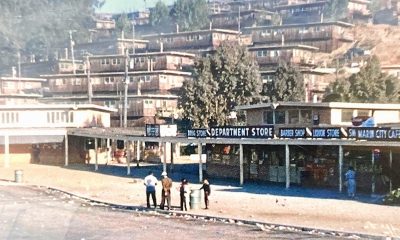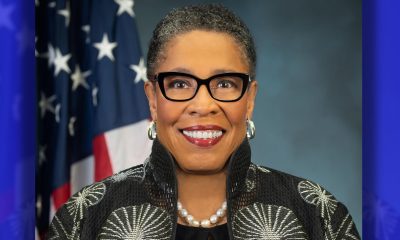Bay Area
Proposed New Fund Would Boost Economic Opportunities: Residents of Golden Gate Village would be the voice in financial priorities
San Rafael, CA — Under a new proposal, residents of Golden Gate Village in Marin City will have a voice in prioritizing investments from a new fund to expand economic opportunities for those living in the 296-unit affordable housing neighborhood. The proposal for the Golden Gate Village Resident Empowerment Fund is to be presented before the Marin County Board of Supervisors during the Feb. 28 meeting, which begins at 9 a.m. in the Board Chamber (Suite 330) at the Marin County Civic Center, 3501 Civic Center Drive, San Rafael.

San Rafael, CA — Under a new proposal, residents of Golden Gate Village in Marin City will have a voice in prioritizing investments from a new fund to expand economic opportunities for those living in the 296-unit affordable housing neighborhood.
The proposal for the Golden Gate Village Resident Empowerment Fund is to be presented before the Marin County Board of Supervisors during the Feb. 28 meeting, which begins at 9 a.m. in the Board Chamber (Suite 330) at the Marin County Civic Center, 3501 Civic Center Drive, San Rafael.
The Board will consider establishing the new fund with the nonprofit Marin Community Foundation (MCF) and transferring $2 million as an initial balance. MCF will then consider making its own grant contribution, as requested by the County. The goal of MCF request is to encourage private donors to follow suit in a unified approach to enhance services for low-income residents of the village, where there is a longstanding need for investments to support new economic opportunities. A series of Resident Listening Sessions are being held between January and March 2023, ensuring that village residents’ direct needs and service requests set the priorities for how the fund is invested. Residents will also be developing the formal name of the fund.
“Through the listening sessions, village residents are giving voice to what their service needs are, how they would like to receive services, and how this fund should invest directly into their community,” said District 3 Supervisor Stephanie Moulton-Peters.
In November 2022, the Marin County Housing Board of Commissioners voted to approve a complete rehabilitation of the 60-year-old village, the largest affordable housing community in Marin. Many longstanding residents, especially among the Black/African American population, have given voice to a history of discrimination and disinvestment in Marin City and Golden Gate Village. This history stems from village residents or their descendants moving to Marin County during World War II to work in the Sausalito shipyards, experiencing first-hand government-endorsed discriminatory practices that prevented them from obtaining loans and purchasing local homes in the post-war era. The segregationally driven practice known as redlining has been illegal since the 1960s.
“Recognizing and rectifying past harms in Marin City is a top priority for me,” said Moulton-Peters. “This resident fund is one example of that.”
If the Board approves the fund’s creation and the initial allocation, County personnel and the Marin Housing Authority will work directly with village residents to develop a Fund Advisory Committee charged with establishing an expenditure plan. The expenditure plan would be based upon the service needs and requests identified during the Resident Listening Sessions, with a goal of beginning initial investments by Fall 2023.
Addressing issues of affordable housing and social equity have been major priorities for the Board of Supervisors, especially after additional economic hardships were brought on by the COVID-19 pandemic. About 12% of Marin County residents identify as a racial minority, but the figure is more than 83% among Golden Gate Village households. The median income for a village resident is $10,820; the countywide figure is $142,300. The homeownership rate in Marin City is 17%, a fraction of the countywide rate of 60%. The census showed 11.2% of village residents live below the poverty line — most of them older adults on fixed incomes.
The County contribution to the Resident Empowerment Fund would originate from $5 million received from the federal government as part of the $1.9 trillion American Rescue Plan Act (ARPA), signed by President Biden in March 2021 to help the country recover from the pandemic.
To watch or participate in the Feb. 28 Board of Supervisors meeting, see instructions on the Board’s archive webpage.
For disability accommodations, please phone (415) 473-6358 (voice), CA Relay 711, or e-mail the Digital Access staff at least five business days in advance of the event. The County will do its best to fulfill requests received with less than five business days’ notice. Copies of documents are available in alternative formats, upon request.
Alameda County
DA Pamela Price Stands by Mom Who Lost Son to Gun Violence in Oakland
Last week, The Post published a photo showing Alameda County District Attorney Pamela Price with Carol Jones, whose son, Patrick DeMarco Scott, was gunned down by an unknown assailant in 2018.

Publisher’s note: Last week, The Post published a photo showing Alameda County District Attorney Pamela Price with Carol Jones, whose son, Patrick DeMarco Scott, was gunned down by an unknown assailant in 2018. The photo was too small for readers to see where the women were and what they were doing. Here we show Price and Jones as they complete a walk in memory of Scott. For more information and to contribute, please contact Carol Jones at 510-978-5517 at morefoundation.help@gmail.com. Courtesy photo.
Bay Area
State Controller Malia Cohen Keynote Speaker at S.F. Wealth Conference
California State Controller Malia Cohen delivered the keynote speech to over 50 business women at the Black Wealth Brunch held on March 28 at the War Memorial and Performing Arts Center at 301 Van Ness Ave. in San Francisco. The Enterprising Women Networking SF Chapter of the American Business Women’s Association (ABWA) hosted the Green Room event to launch its platform designed to close the racial wealth gap in Black and Brown communities.

By Carla Thomas
California State Controller Malia Cohen delivered the keynote speech to over 50 business women at the Black Wealth Brunch held on March 28 at the War Memorial and Performing Arts Center at 301 Van Ness Ave. in San Francisco.
The Enterprising Women Networking SF Chapter of the American Business Women’s Association (ABWA) hosted the Green Room event to launch its platform designed to close the racial wealth gap in Black and Brown communities.
“Our goal is to educate Black and Brown families in the masses about financial wellness, wealth building, and how to protect and preserve wealth,” said ABWA San Francisco Chapter President LaRonda Smith.
ABWA’s mission is to bring together businesswomen of diverse occupations and provide opportunities for them to help themselves and others grow personally and professionally through leadership, education, networking support, and national recognition.
“This day is about recognizing influential women, hearing from an accomplished woman as our keynote speaker and allowing women to come together as powerful people,” said ABWA SF Chapter Vice President Velma Landers.
More than 60 attendees dined on the culinary delights of Chef Sharon Lee of The Spot catering, which included a full soul food brunch of skewered shrimp, chicken, blackened salmon, and mac and cheese.
Cohen discussed the many economic disparities women and people of color face. From pay equity to financial literacy, Cohen shared not only statistics, but was excited about a new solution in motion which entailed partnering with Californians for Financial Education.
“I want everyone to reach their full potential,” she said. “Just a few weeks ago in Sacramento, I partnered with an organization, Californians for Financial Education.
“We gathered 990 signatures and submitted it to the [California] Secretary of State to get an initiative on the ballot that guarantees personal finance courses for every public school kid in the state of California.
“Every California student deserves an equal opportunity to learn about filing taxes, interest rates, budgets, and understanding the impact of credit scores. The way we begin to do that is to teach it,” Cohen said.
By equipping students with information, Cohen hopes to close the financial wealth gap, and give everyone an opportunity to reach their full financial potential. “They have to first be equipped with the information and education is the key. Then all we need are opportunities to step into spaces and places of power.”
Cohen went on to share that in her own upbringing, she was not guided on financial principles that could jump start her finances. “Communities of color don’t have the same information and I don’t know about you, but I did not grow up listening to my parents discussing their assets, their investments, and diversifying their portfolio. This is the kind of nomenclature and language we are trying to introduce to our future generations so we can pivot from a life of poverty so we can pivot away and never return to poverty.”
Cohen urged audience members to pass the initiative on the November 2024 ballot.
“When we come together as women, uplift women, and support women, we all win. By networking and learning together, we can continue to build generational wealth,” said Landers. “Passing a powerful initiative will ensure the next generation of California students will be empowered to make more informed financial decisions, decisions that will last them a lifetime.”
Bay Area
MAYOR BREED ANNOUNCES $53 MILLION FEDERAL GRANT FOR SAN FRANCISCO’S HOMELESS PROGRAMS
San Francisco, CA – Mayor London N. Breed today announced that the U.S. Department of Housing and Urban Development (HUD) has awarded the city a $53.7 million grant to support efforts to renew and expand critical services and housing for people experiencing homelessness in San Francisco.

FOR IMMEDIATE RELEASE:
Wednesday, January 31, 2024
Contact: Mayor’s Office of Communications, mayorspressoffice@sfgov.org
***PRESS RELEASE***
MAYOR BREED ANNOUNCES $53 MILLION FEDERAL GRANT FOR SAN FRANCISCO’S HOMELESS PROGRAMS
HUD’s Continuum of Care grant will support the City’s range of critical services and programs, including permanent supportive housing, rapid re-housing, and improved access to housing for survivors of domestic violence
San Francisco, CA – Mayor London N. Breed today announced that the U.S. Department of Housing and Urban Development (HUD) has awarded the city a $53.7 million grant to support efforts to renew and expand critical services and housing for people experiencing homelessness in San Francisco.
HUD’s Continuum of Care (CoC) program is designed to support local programs with the goal of ending homelessness for individuals, families, and Transitional Age Youth.
This funding supports the city’s ongoing efforts that have helped more than 15,000 people exit homelessness since 2018 through City programs including direct housing placements and relocation assistance. During that time San Francisco has also increased housing slots by 50%. San Francisco has the most permanent supportive housing of any county in the Bay Area, and the second most slots per capita than any city in the country.
“In San Francisco, we have worked aggressively to increase housing, shelter, and services for people experiencing homelessness, and we are building on these efforts every day,” said Mayor London Breed. “Every day our encampment outreach workers are going out to bring people indoors and our City workers are connecting people to housing and shelter. This support from the federal government is critical and will allow us to serve people in need and address encampments in our neighborhoods.”
The funding towards supporting the renewal projects in San Francisco include financial support for a mix of permanent supportive housing, rapid re-housing, and transitional housing projects. In addition, the CoC award will support Coordinated Entry projects to centralize the City’s various efforts to address homelessness. This includes $2.1 million in funding for the Coordinated Entry system to improve access to housing for youth and survivors of domestic violence.
“This is a good day for San Francisco,” said Shireen McSpadden, executive director of the Department of Homelessness and Supportive Housing. “HUD’s Continuum of Care funding provides vital resources to a diversity of programs and projects that have helped people to stabilize in our community. This funding is a testament to our work and the work of our nonprofit partners.”
The 2024 Continuum of Care Renewal Awards Include:
- $42.2 million for 29 renewal PSH projects that serve chronically homeless, veterans, and youth
- $318,000 for one new PSH project, which will provide 98 affordable homes for low-income seniors in the Richmond District
- $445,00 for one Transitional Housing (TH) project serving youth
- $6.4 million dedicated to four Rapid Rehousing (RRH) projects that serve families, youth, and survivors of domestic violence
- $750,00 for two Homeless Management Information System (HMIS) projects
- $2.1 million for three Coordinated Entry projects that serve families, youth, chronically homeless, and survivors of domestic violence
In addition, the 2023 CoC Planning Grant, now increased to $1,500,000 from $1,250,000, was also approved. Planning grants are submitted non-competitively and may be used to carry out the duties of operating a CoC, such as system evaluation and planning, monitoring, project and system performance improvement, providing trainings, partner collaborations, and conducting the PIT Count.
“We are very appreciative of HUD’s support in fulfilling our funding request for these critically important projects for San Francisco that help so many people trying to exit homelessness,” said Del Seymour, co-chair of the Local Homeless Coordinating Board. “This funding will make a real difference to people seeking services and support in their journey out of homelessness.”
In comparison to last year’s competition, this represents a $770,000 increase in funding, due to a new PSH project that was funded, an increase in some unit type Fair Market Rents (FMRs) and the larger CoC Planning Grant. In a year where more projects had to compete nationally against other communities, this represents a significant increase.
Nationally, HUD awarded nearly $3.16 billion for over 7,000 local homeless housing and service programs including new projects and renewals across the United States.
-

 Activism4 weeks ago
Activism4 weeks agoOakland Post: Week of March 27 – April 2, 2024
-

 #NNPA BlackPress4 weeks ago
#NNPA BlackPress4 weeks agoFrom Raids to Revelations: The Dark Turn in Sean ‘Diddy’ Combs’ Saga
-

 #NNPA BlackPress4 weeks ago
#NNPA BlackPress4 weeks agoCOMMENTARY: D.C. Crime Bill Fails to Address Root Causes of Violence and Incarceration
-

 #NNPA BlackPress4 weeks ago
#NNPA BlackPress4 weeks agoCOMMENTARY: Lady Day and The Lights!
-

 #NNPA BlackPress4 weeks ago
#NNPA BlackPress4 weeks agoMayor, City Council President React to May 31 Closing of Birmingham-Southern College
-

 #NNPA BlackPress4 weeks ago
#NNPA BlackPress4 weeks agoBaltimore Key Bridge Catastrophe: A City’s Heartbreak and a Nation’s Alarm
-

 #NNPA BlackPress4 weeks ago
#NNPA BlackPress4 weeks agoBaltimore’s Key Bridge Struck by Ship, Collapses into Water
-

 #NNPA BlackPress4 weeks ago
#NNPA BlackPress4 weeks agoBeloved Actor and Activist Louis Cameron Gossett Jr. Dies at 87





















































